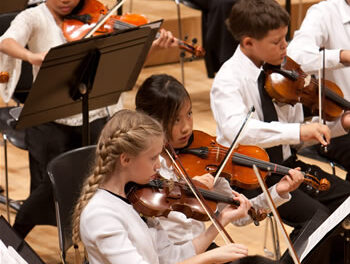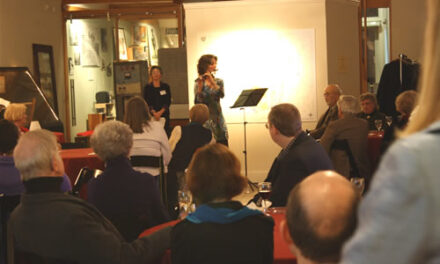The Spoleto Festival USA (May 27 – June 12) is celebrating its 29th season in Charleston, SC, with nearly 150 concerts, dramas, and dance and special events. At the same time, Spoleto’s younger sibling, Piccolo Spoleto, put together by the City of Charleston Office of Cultural Affairs, is offering over 700 events, many of them free and others at a nominal fee. On Saturday, May 28, our first day in Charleston this year, we took advantage of the “Choral Festival of Churches and Synagogues” featuring eight outstanding choruses – ranging from the Charleston Southern University Concert Singers to the Redlands Baptist Church Gospel Choir from Washington, D.C. – performing in a variety of Charleston’s historic and beautiful churches. We didn’t get to all of them but we did hear three very fine choirs.
“Renaissance,” a group from Charlotte directed by Robert Pritchard and accompanied by J. Michael Grant, performed a varied program of music by C.V. Stanford, Pachelbel, and Bach, plus “Danny Boy,” “Shenandoah,” and a clutch of spirituals. They are a fine group with a beautiful blend of 25 voices.
Thanks to some comfortable walking shoes and a fairly mild day (for the Low Country), we walked about three miles across Charleston to the (Episcopal) Cathedral of St. Luke and St. Paul, where we heard the Chamber Chorus of the Oratorio Singers of Charlotte. This 30-voice group, directed by Scott Allen Jarrett, sang Herbert Howells’ hauntingly beautiful Requiem flawlessly. (They also did “At the Lighting of the Lamps,” by Julian Wachner, which we missed because the walk across town took longer than we had anticipated.) They closed with Vaughan Williams’ inspiring setting of Psalm 90, “Lord, Thou hast been our refuge.” Precise intonation and phrasing, and the interpretations themselves, were outstanding under Jarrett’s conducting.
A walk back across town – with a stop on King Street to re-hydrate our parched bodies – took us to St. Philips Episcopal Church, one of the oldest in Charleston, and a concert by “Antioch,” a 12-member professional ensemble whose singers have been making names for themselves in and around New York City since 1997. They were impressive, especially in their performance of William Albright’s harmonically-tight “Chichester Mass.” From one pitch-pipe reference, they sang the 14-minute piece through dissonances that jelled perfectly, moving the air in this 18th-century (reconstructed) cathedral like the sound of wings beyond this province – and without even the slightest hint of a waver of pitch. The audience recognized this extraordinary performance and showered extended and vigorous applause on the artists. They also performed Leo Sowerby’s Magnificat and Nunc Dimittis in D, three charming Chansons by Ravel, and selections from both books of Brahms’ Liebeslieder Waltzes. The waltzes were spirited, lilting and seemed just the way Brahms must have intended them. This is a group well worth hearing anytime you have the opportunity.
Five days later – on Thursday, June 2 – we were back at the Cathedral of St. Luke and St. Paul, with its three bright stained glass windows drawing all eyes to the worshipful purpose of the space. The Westminster Choir has performed as part of Spoleto USA Festival every year since the first festival in 1976. The have come to be favorites with festival regulars, and the church was packed to the rafters. These bright young singers, all voice majors at Westminster Choir College of Rider University in Princeton, New Jersey, are well versed and trained in the art of vocal ensemble. (They were also heard in bit parts and choruses in the three operas we saw – Don Giovanni, Sleeping Beauty, and Die Vögel – and were also scheduled to perform Brahms’ Ein deutsches Requiem on June 8.
The late-afternoon concert on June 2 began with the choir accompanied by a small chamber orchestra in a performance of John Corigliano’s “Fern Hill.” The text is from a Dylan Thomas poem, rich in symbolism and complex in references. Unfortunately the words were not printed in the program. The music has a certain New England flavor to it for me – or was it the folk music of the British Isles? This work was written in 1960 and premiered by the choir in which Corigliano had sung as a boy; it is now part of the Dylan Thomas Trilogy, for soloists, chorus, and orchestra, completed as a package only in 1999. Chorister Jenna Lebberz sang the mezzo-soprano solo, her excellent voice filling the church with enchantment. The choir and the orchestra, made up of members of the Spoleto Festival Orchestra, were equally excellent in this performance.
Arvo Pärt’s Magnificat provided an almost jarring contrast with its austere and ethereal quality. It took a few moments to acclimate to the vastly different musical style. The choir did well, accomplishing the tonal integrity necessary effectively to perform this late 20th-century masterpiece of spiritual transcendence.
Flummerfelt, who last year was named Conductor of the Year by Musical America, has been the choir’s leader since 1971 and shows no signs of slowing down. He is especially fond of the choral music of Brahms and chose two part-songs and five of the Zigeunerlieder (Gypsy Songs) for this concert. They were rich treats, and the choir’s enthusiasm, purposeful phrasing, and warm romantic sound made for pure delight. The choir’s pianist, the accomplished Nancianne Parrella, showed why she is acclaimed as one of the preeminent choral accompanists in America.
Three very nice 20th-century partsongs – “The Hour-Glass” (Ben Johnson) by Irving Fine, “The Coolin” (James Stephens) by Samuel Barber (from Reincarnations, Op. 16) and “A Red, Red Rose” (Robert Burns) by James Mulholland – were magical, with the choir at its a cappella best in these songs of exotic and concentrated passion.
The concert was brought to a satisfying conclusion with some “Lighter Fare” and Westminster Choir favorites – the traditional English folk-song “O Waly Waly,” “Flow Gently Sweet Afton,” and finally “O Danny Boy.”
The week was too short. We felt we could only scratch the surface, yet the music will live on in our heart’s memory far, far from now.
Note: This is the first of a series of reviews of Spoleto USA and Piccolo Spoleto events by CVNC critics.












